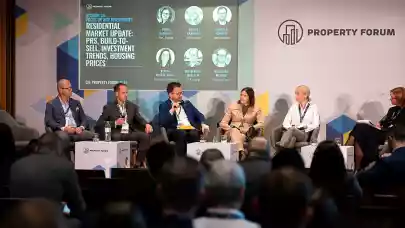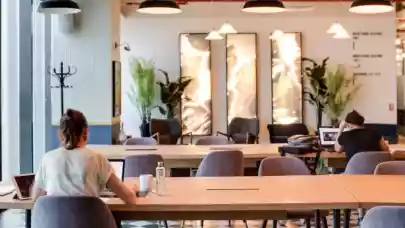
Price pressure and uncertainties still exist in the residential market in CEE. Build-to-sell is dominant and build-to-rent has already started in some countries. According to the panel focusing on the challenges and opportunities in the residential market at CEE Property Forum 2024 in Vienna, stabilised construction costs and lower mortgage prices, however, may boost investments.
This panel, chaired by Kinga Barchoń, Partner, Real Estate Leader, PwC Polska explored private rented sector (PRS) developments, build-to-sell strategies, and investment trends. Participants also expressed their views on the rising demand for rented properties as housing prices continue to increase across the region and affordability is getting lower in many countries in CEE. Practically all members of this panel highlighted the importance of lowering central interest rates which could push developments, encourage people to take out more mortgages and use bank finance for developers.
At the beginning of this panel Jan-Hendrik Walloch, Managing Partner, ECE Living referred to the decoupling trend that was starting from the US towards Europe, which has a very negative effect. In his opinion, Poland is one of the few markets which has been very resilient towards this. He said that the leading economies in Europe like Germany and France are have a pretty tough time and there will be a cold coming across the continent. „I think the economic downturn in mainland Europe will have a fallout defect, because we have a lot of extended workbench employees and jobs in Central Europe which heavily rely on France and Germany, and this will eventually also trickle through. Positive leverage is coming back, we won't see a lot of core investors coming back to the market, because most of the investments currently are driven more by a development-led strategy, which always has high yielding and is less dependent on an exit”
He also cited examples from the Mediterranean region where some countries, hit hardest during the GFC, could overcome their difficulties. Spain, Italy and to a certain extent Portugal haven't over-levered in terms of bank debt and remained very resilient. „For the time being they have a very solid economy which still doesn't provide too much uncertainty to investors, ie. private individuals. The build-to-sell market is still going very well”
Renata McCabe-Kudła, Country Manager, Grupo Lar Poland added that the financing conditions are the same in Spain and in Poland, you can get financing with the same amount of leverage. „The regulations are rather tough, the financing is available, but there's nothing irrational going on”, she said.
Where the institutional money can be allocated? That was the question from the chair to Stanislav Kubáček, Managing Director | Head of Investment, Eastern Europe, Heimstaden. His company owns and operates rental housing in nine countries of Europe, including Poland where they developed apartment houses since 2020. „Due to low yields in alternative bond markets, a lot of money from core investors went into real estate, mainly into PRS. Now that has retreated. That is not coming back in the same size, because there was an anomaly of ultra-low interest rates which will not come back. So a lot of the core money will stay in corporate and government bonds, etc” he explained, adding however that he was cautiously optimistic since inflation and financing came under control and most of the economies of CEE have still positive or sluggish growth, including wages and rental prices in some sectors.
Describing the mood of developers in Poland, Jan-Hendrik Walloch spoke about their changes. He informed the audience that a lot of stock or a lot of projects which were designed to be PRS or build-to-rent went back to the build-to-sell market because developers didn't feel the timing in terms of certainty of selling units. „You make a much better return on residentially zoned land in selling individually, as build-to-sell, than you would ever do with build-to-rent.”
Stanislav Kubáček raised concern over the currency issue, especially for German investors who are not buying in Poland because the yielding assets are in local currency, not in euros. „With falling interest rates local institutional investors, insurance companies, etc, should take the opportunity and buy residential assets for the first time in PRS”, he argued.
Renata McCabe-Kudła commented on the possible solution to this problem saying that joint ventures were the way out. Grupo Lar, both in Spain and in Poland, operates via joint venture agreements successfully, where it is the manager with a minority shareholding. As for the appetite of investors and the mood of developers, she disagreed with some members of the panel. She said that there was a growing interest from the Baltic countries, other CE countries, and some starting interest from Western Europe.
Zuzana Kanalová, Head of Real Estate, VÚB Banka demonstrated a similar observation. She said that her bank is actively financing residential projects in Romania and Hungary and the build-to-rent model already started in Slovakia, admitting that volumes are very low yet.
Later in the discussion, the chair turned to price increases and asked Waldemar Wasiluk, CEO / Vice President of Polish developer Victoria Dom to tell his experience on this issue. He said that after a big hike in prices in 2022 and 2023 there was a stabilization of pricing over the last 12 months. The supply is growing but the demand is shrinking so developers have to give discounts and incentives. „With interest rates going down and the inflation easing up the market will slowly move up over the next two to three quarters and the prices will be stabilizing over the next couple of quarters”, he hoped.
Like other panellists, he also emphasized the need to shift focus to alternative residential subsectors such as student housing and carehouses for elderly people. He mentioned that local municipalities desperately need more social housing alternatives and they can rely on international practice regarding the management of rented private houses for social purposes. He was confident that with tens of thousands of international students coming each year to Poland, developers would find a way to start student housing projects. In connection to financing senior living, Renata McCabe-Kudła opted for a reverse mortgage. She argued that this would be viable for all stakeholders but require a change in attitude across the region.



